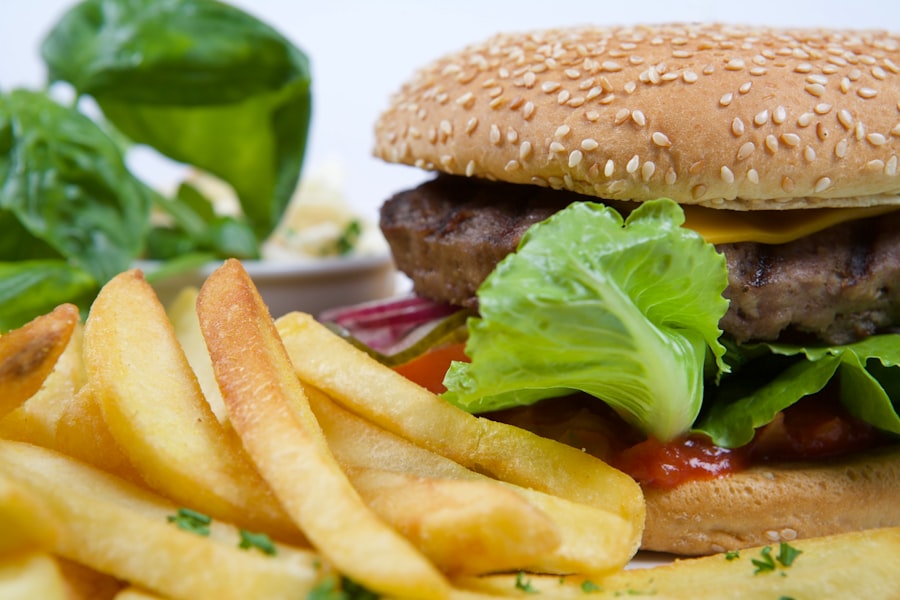Fatty liver disease, or hepatic steatosis, is a condition characterized by the accumulation of excess fat in liver cells. As you age, your body undergoes various changes that can increase the risk of developing this condition. Factors such as decreased metabolism, hormonal changes, and a sedentary lifestyle can contribute to the onset of fatty liver disease.
In seniors, this condition can lead to more severe complications, including liver inflammation, fibrosis, and even cirrhosis if left unmanaged. Understanding the nuances of fatty liver disease is crucial for you or your loved ones, as it can significantly impact overall health and quality of life. Recognizing the symptoms of fatty liver disease can be challenging, as many individuals may not experience noticeable signs until the condition has progressed.
Common symptoms include fatigue, discomfort in the upper right abdomen, and unexplained weight loss. However, many seniors may attribute these symptoms to aging or other health issues. Therefore, it is essential to be proactive about liver health by undergoing regular check-ups and screenings.
Early detection can lead to more effective management strategies, allowing you to maintain a healthier lifestyle and mitigate potential complications associated with fatty liver disease.
Key Takeaways
- Fatty liver disease is common in seniors and can lead to serious health complications if not managed properly.
- A senior-friendly diet for fatty liver should focus on reducing fat and sugar intake while increasing consumption of nutrient-dense foods.
- Recommended foods for a senior-friendly fatty liver diet include fruits, vegetables, whole grains, lean proteins, and low-fat dairy products.
- Seniors with fatty liver disease should avoid high-fat, high-sugar, and processed foods, as well as excessive alcohol consumption.
- Incorporating healthy fats like avocados, nuts, and fatty fish into a senior-friendly fatty liver diet can provide essential nutrients and support liver health.
Importance of a Senior-Friendly Diet for Fatty Liver
A senior-friendly diet plays a pivotal role in managing fatty liver disease.
A well-balanced diet can help reduce fat accumulation in the liver, improve liver function, and promote overall well-being.
By focusing on nutrient-dense foods and avoiding harmful substances, you can take significant steps toward managing your condition effectively. Moreover, a senior-friendly diet is not just about what you eat; it’s also about how you eat. Mindful eating practices can enhance your relationship with food and help you make healthier choices.
This includes paying attention to portion sizes, eating slowly, and savoring each bite. By fostering a positive attitude toward food and nutrition, you can create a sustainable eating pattern that supports your liver health while also being enjoyable.
Recommended Foods for a Senior-Friendly Fatty Liver Diet

When it comes to managing fatty liver disease, certain foods can be particularly beneficial for seniors. Incorporating fruits and vegetables into your daily meals is essential, as they are rich in vitamins, minerals, and antioxidants that support liver health. Leafy greens like spinach and kale, along with cruciferous vegetables such as broccoli and Brussels sprouts, are excellent choices.
These foods not only provide essential nutrients but also help detoxify the liver and reduce inflammation. In addition to fruits and vegetables, whole grains should be a staple in your diet. Foods like brown rice, quinoa, and whole-grain bread are high in fiber and can help regulate blood sugar levels while promoting healthy digestion.
Lean proteins such as fish, chicken, and legumes are also important for maintaining muscle mass and overall health as you age. Including these foods in your meals can create a balanced diet that supports your liver while providing the energy you need for daily activities.
Foods to Avoid for Seniors with Fatty Liver Disease
| Foods to Avoid | Reason |
|---|---|
| High-fat dairy products | High in saturated fats |
| Processed foods | High in trans fats and added sugars |
| Red meat | High in saturated fats |
| Sugary drinks | High in added sugars |
| Alcohol | Can worsen liver damage |
While there are many foods that can support liver health, there are also several that you should avoid if you have fatty liver disease. High-sugar foods and beverages are particularly detrimental, as they can lead to increased fat accumulation in the liver. This includes sugary drinks like soda and fruit juices, as well as sweets such as cakes and candies.
Instead of reaching for these items, consider healthier alternatives like water or herbal teas. Additionally, saturated fats and trans fats should be limited in your diet. Foods such as fried items, processed snacks, and fatty cuts of meat can exacerbate liver issues.
Instead of these unhealthy fats, focus on incorporating healthier options like avocados, nuts, and olive oil into your meals. By being mindful of what you consume and making conscious choices to avoid harmful foods, you can significantly improve your liver health over time.
Incorporating Healthy Fats into a Senior-Friendly Fatty Liver Diet
Healthy fats play an essential role in a senior-friendly diet for fatty liver disease. Unlike saturated and trans fats that can worsen liver conditions, unsaturated fats can actually support liver function and overall health. Foods rich in omega-3 fatty acids, such as salmon, walnuts, and flaxseeds, are particularly beneficial.
These healthy fats can help reduce inflammation in the liver and improve lipid profiles. Incorporating healthy fats into your meals doesn’t have to be complicated. You might consider drizzling olive oil over salads or using it as a base for cooking vegetables.
Snacking on nuts or adding avocado to your sandwiches can also be simple ways to increase your intake of healthy fats. By making these small adjustments to your diet, you can enjoy flavorful meals while supporting your liver health at the same time.
The Role of Fiber in a Senior-Friendly Fatty Liver Diet

Fiber is another crucial component of a senior-friendly diet for managing fatty liver disease. It aids in digestion and helps regulate blood sugar levels, which is particularly important for seniors who may be at risk for diabetes or other metabolic disorders. Foods high in fiber include whole grains, fruits, vegetables, legumes, and nuts.
By incorporating these foods into your daily meals, you can promote better digestive health while also supporting your liver. Moreover, fiber helps to reduce cholesterol levels and improve overall heart health—an important consideration for seniors. A diet rich in fiber can also help you feel fuller for longer periods of time, which may assist with weight management efforts.
As you focus on including more fiber-rich foods in your diet, consider experimenting with different recipes that highlight these ingredients to keep your meals exciting and satisfying.
Hydration and Its Impact on Fatty Liver in Seniors
Staying hydrated is vital for everyone but becomes even more critical as you age and manage conditions like fatty liver disease. Proper hydration supports various bodily functions, including digestion and detoxification processes that are essential for maintaining liver health. Drinking enough water helps flush out toxins from the body and ensures that the liver can function optimally.
As a senior managing fatty liver disease, aim to drink at least eight glasses of water daily or more if you’re active or live in a hot climate. Herbal teas or infused water with fruits can also be refreshing alternatives if plain water feels monotonous. Being mindful of your hydration levels not only benefits your liver but also enhances your overall well-being by improving energy levels and cognitive function.
Meal Planning and Portion Control for Seniors with Fatty Liver
Effective meal planning is an invaluable tool for seniors managing fatty liver disease. By planning your meals ahead of time, you can ensure that you’re making healthy choices while avoiding impulsive decisions that may lead to unhealthy eating habits. Consider creating a weekly meal plan that incorporates a variety of nutrient-dense foods while keeping portion sizes in check.
Portion control is particularly important for seniors with fatty liver disease because overeating—even healthy foods—can contribute to weight gain and further strain the liver. Using smaller plates or measuring out servings can help you maintain appropriate portion sizes without feeling deprived. Additionally, preparing meals in advance allows you to have healthy options readily available when hunger strikes.
The Benefits of Regular Exercise for Seniors with Fatty Liver
Regular exercise is another critical component of managing fatty liver disease effectively. Engaging in physical activity helps improve insulin sensitivity and promotes weight loss—two factors that are essential for reducing fat accumulation in the liver. As a senior, finding an exercise routine that suits your abilities is key; this could include walking, swimming, or even gentle yoga.
Incorporating regular exercise into your routine not only benefits your liver but also enhances overall physical health and mental well-being. Exercise releases endorphins that can improve mood and reduce stress levels—factors that are often overlooked but play a significant role in managing chronic conditions like fatty liver disease. Aim for at least 150 minutes of moderate-intensity exercise each week to reap the full benefits.
Tips for Managing Stress and Sleep for Seniors with Fatty Liver Disease
Managing stress effectively is crucial for seniors dealing with fatty liver disease since chronic stress can negatively impact overall health and exacerbate existing conditions. Finding relaxation techniques that work for you—such as meditation, deep breathing exercises, or engaging in hobbies—can significantly improve your quality of life. Prioritizing self-care is essential; taking time each day to unwind can help lower stress levels.
Sleep is equally important when it comes to managing fatty liver disease. Poor sleep quality can lead to increased inflammation and metabolic issues that may worsen liver health over time. Establishing a consistent sleep routine by going to bed and waking up at the same time each day can help regulate your sleep patterns.
Creating a calming bedtime environment free from distractions will also promote better sleep quality.
Consulting with a Healthcare Professional for a Senior-Friendly Fatty Liver Diet Plan
Finally, consulting with a healthcare professional is vital when developing a senior-friendly diet plan for managing fatty liver disease. A registered dietitian or nutritionist can provide personalized guidance based on your specific needs and preferences while considering any other medical conditions you may have. They can help you create a balanced meal plan that incorporates all the necessary nutrients while avoiding harmful foods.
Regular check-ins with healthcare professionals will also allow you to monitor your progress effectively. They can provide valuable insights into how dietary changes are impacting your liver health over time and make adjustments as needed. By working collaboratively with healthcare providers, you empower yourself to take control of your health journey while managing fatty liver disease effectively.
In conclusion, understanding fatty liver disease is crucial for seniors looking to maintain their health as they age. By adopting a senior-friendly diet rich in nutrient-dense foods while avoiding harmful substances, incorporating healthy fats and fiber into meals, staying hydrated, planning meals mindfully, exercising regularly, managing stress effectively, prioritizing sleep quality, and consulting healthcare professionals when needed—you can take significant steps toward improving your overall well-being while managing fatty liver disease successfully.
For seniors managing fatty liver disease, adopting a suitable diet plan is crucial for maintaining liver health and overall well-being. A related article that provides valuable insights into creating an effective fatty liver diet plan for seniors can be found on Explore Senior Health. This resource offers comprehensive guidance on dietary adjustments and lifestyle changes that can help manage and potentially reverse fatty liver disease. For more detailed information, you can read the full article by visiting Explore Senior Health.
WATCH THIS! 🧃The 60-Year Liver Lie: Why Your “Healthy” Juice Is Destroying Your Liver
FAQs
What is a fatty liver diet plan for seniors?
A fatty liver diet plan for seniors is a nutritional plan specifically designed to support liver health and manage the symptoms of fatty liver disease in older adults. It typically includes foods that are low in saturated fats, sugar, and refined carbohydrates, and high in fiber, antioxidants, and healthy fats.
Why is a fatty liver diet plan important for seniors?
Seniors are at a higher risk of developing fatty liver disease due to age-related changes in metabolism and lifestyle factors. A fatty liver diet plan can help manage the condition and prevent further liver damage by promoting healthy eating habits and supporting overall liver function.
What foods are typically included in a fatty liver diet plan for seniors?
A fatty liver diet plan for seniors often includes a variety of fruits, vegetables, whole grains, lean proteins, and healthy fats such as those found in avocados, nuts, and fatty fish. It also emphasizes the importance of staying hydrated and limiting the intake of processed foods, sugary beverages, and alcohol.
Are there any specific foods that seniors with fatty liver disease should avoid?
Seniors with fatty liver disease should avoid or limit their intake of foods high in saturated fats, trans fats, added sugars, and refined carbohydrates. This includes fried foods, processed snacks, sugary desserts, and sugary drinks. Alcohol consumption should also be limited or avoided, as it can exacerbate liver damage.
Can a fatty liver diet plan for seniors improve liver health?
Yes, following a fatty liver diet plan can help improve liver health in seniors by reducing the accumulation of fat in the liver, managing inflammation, and supporting overall liver function. Combined with regular physical activity and weight management, a healthy diet can play a crucial role in managing fatty liver disease in older adults.
